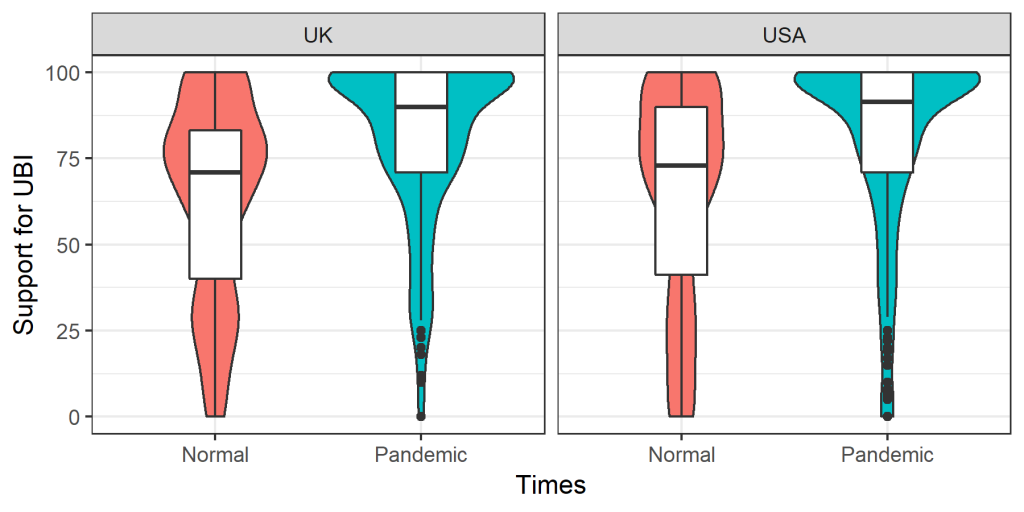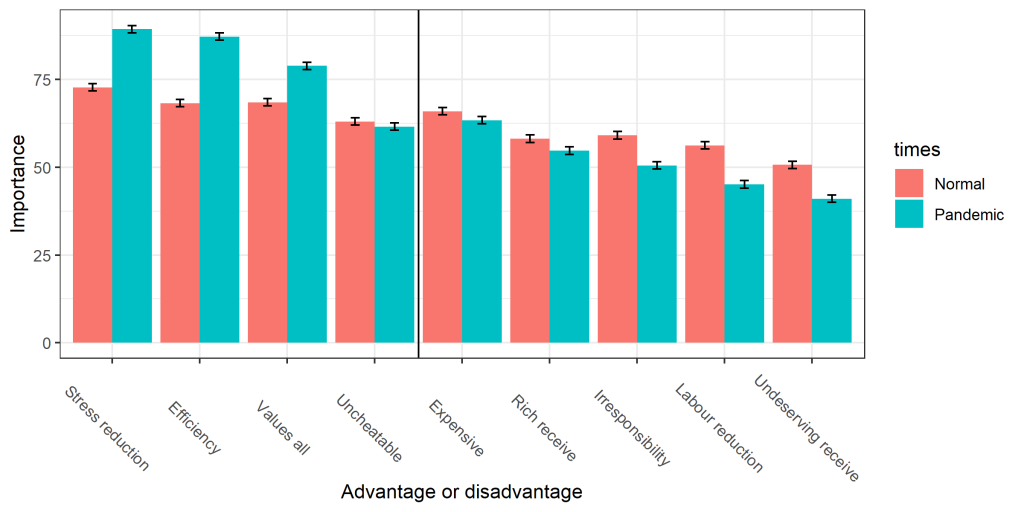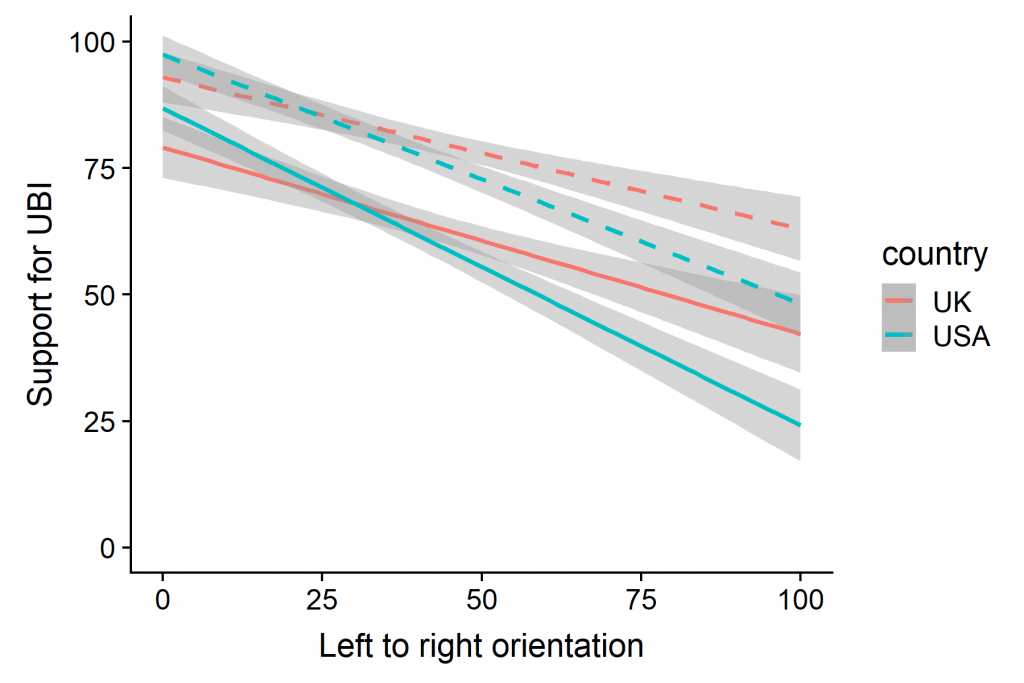The idea of an unconditional basic income, paid to all (UBI), has a long history. Very long in fact. Yet, although the policy has been deemed philosophically and (sometimes) economically attractive, it has generally languished in the bailiwick of enthusiasts, mavericks, philosophers and policy nerds (these are, by the way, overlapping categories). But now, with the global pandemic, UBI is very much back in the spotlight. Previous sceptics are coming out with more enthusiastic assessments (for example, here and here). Spain apparently aims to roll out a UBI scheme ‘as soon as possible‘ in response to the crisis, with the aim that this becomes a ‘permanent instrument’ of how the Spanish state works. And even the US Congress relief cheques for citizens, though short-term, have a UBI-like quality to them. So why, all over the place, does UBI suddenly seem like such a great idea?
Answering this question requires answering another, prior one: why didn’t people think it was such a great idea before? To understand why people’s objections have gone away, you need to understand what they were before, as well as why they seem less compelling in this time of upheaval. UBI is a policy that appears to suffer from ‘intuition problems’. You can model it all you like and show that it would be feasible, efficient and cost effective; but many people look at it and think ‘Mah! Giving people money without their having to do anything! Something wrong with that!’. It’s like a musical chord that is not quite in tune; and that’s a feeling that it is hard to defeat with econometrics. But intuitions such as these might be very context-dependent: and the context of society certainly has changed in the last few months.
To try to understand if the acceptibility of UBI to the public has changed for these pandemic-affected times, and, if so, why, Matthew Johnson, Elliott Johnson, Rebecca Saxe and I collected data on April 7th from 400 UK and 400 US residents. This was not a representative sample from either country, but we had a good balance of genders and a spread of age.
We first described a UBI policy to respondents, and asked them to rate how good an idea they found it, both for normal times, and for the times of this pandemic and its aftermath. As the figure below shows, they almost universally thought it was a better idea for times of the pandemic and its aftermath than before-on average, 16 points better on a 1-100 scale.

Actually, these participants thought UBI was a better idea for normal times than I would have expected, which is hard to interpret without some historical data on this participant pool. Support for UBI has found to vary a lot, in the past, depending on how you frame the policy and what alternatives you pit it against. In our study, it was not up against any alternative scheme; just rated as a good or bad idea.
Now, why was UBI thought a better idea for pandemic times than normal times? We listed nine of the most obvious advantages and disadvantages of the policy, and asked respondents to say how important they felt each of these would be for their overall assessment of the policy – again, as a policy for normal times, and for pandemic times. The advantages were: knowing there is a guaranteed income reduces stress and anxiety; the policy is simple and efficient; the universality gives a value to every individual in society; and the system cannot be cheated. The disadvantages were: it’s expensive; you would be paying money to the rich, who do not need it; people might use it irresponsibly, like on gambling or drugs; people would be less prone to work for money; and people who did not deserve it would get it. All of these pros and cons were rating as having some importance for the desirability of the policy in normal times, though naturally with different weightings for different people.

So what was different when viewing the policy for pandemic times? Basically, three key advantages (reduces stress and anxiety; efficiency and simplicity; and giving a value to every individual) became much more important in pandemic times; whilst three of the key drawbacks (people might use it irresponsibly; the labour market consequences; and receipt by the undeserving), became rather less important. I guess these findings make sense; given the rapidity with which the pandemic has washed over the population, you really need something simple and efficient; given how anxiety-provoking it is, it is imperative to reassure people; and given that millions of people are economically inactive anyway, not through their own choice, potential labour market consequences are moot. Rather to our surprise, the expense of the policy was not rated as the most important consideration for normal times; and nor had this become a less important consideration now, when figures of £330 billion or $1 trillion seem to be flying around all over the place.
The strongest predictors of supporting UBI in normal times were rating highly: the importance of stress and anxiety reduction; the efficiency of the policy; and the valuing of every individual. So it is no mystery that in pandemic times, when those particular three things are seen as much more important, that the overall level of support for the policy should go up. In other words, what the pandemic seems to do is make all people weight highly the considerations that the most pro-UBI people already rated highly for normal times anyway. Perhaps the most intriguing of the pandemic-related shifts in importance of the different factors was the increase in importance of giving every individual in society a value. It is not obvious to me why the pandemic should make us want every individual to have a value, any more than we should want this the rest of the time. Perhaps because the pandemic is some kind of common threat, that we can only solve by all working collaboratively? Perhaps because the pandemic reminds us of our massive interdependence? Because we are all in some important sense alike in the face of the disease?
Whatever the reason, our respondents felt it was more important, in these times, for every person in society to be accorded a value. And for me, that is one of the most philosophically appealing aspects of UBI. Not that it decreases income inequality, which unless it is very large, it will probably not do to any appreciable extent; not just that it gives people certainty in rapidly fluctuating times, which it would do; but that its existence constitutes a particular type of social category, a shared citizenship. Getting your UBI would be one of those few things that we can all do – like having one vote or use of an NHS hospital – to both reflect and constitute our common membership of, and share in, a broader social entity. In other words, in addition to all its pragmatic and adminstrative appeal, UBI bestows a certain dignity on everyone, that may help promote health, foster collective efficacy, and mitigate the social effects of the myriad and obvious ways we are each valued differently by society. And these times, apparently, are making the value of this unconditional dignity more apparent.
One last point: people who consider themselves on the left of politics were more favourable to UBI than those on the right (particularly in the US sample; which is interesting given the places of Milton Friedman and Richard Nixon in UBI’s pedigree). But the boost in support for the policy that came from pandemic applied absolutely across the political spectrum. Even those on the right wing of our sample thought it was a pretty good idea for pandemic times (with, of course, the caveat that this was not a representative sample, and we did not offer them any alterrnative to UBI that they might have preferred). So, just possibly, an advantage of UBI schemes in this uncertain time is that pretty much everyone, whatever their ideology, can see what the appeal of the scheme is. That may yet prove important.

June 2nd 2020 update: We have now written this study up. You can download the preprint here.
Discover more from Daniel Nettle
Subscribe to get the latest posts sent to your email.